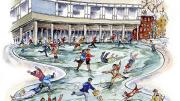1934
The College funds five $1,000 fellowships for prospective freshmen who live and attend school in the Midwest: an experiment by President James B. Conant to attract “the most promising young men throughout the whole nation.”
1939
“The Undergraduate Week,” by William R. Frye ’40, reports: “If Harvard ever was composed solely of the ‘upper crust’ of society, it is not so composed now”: the Student Employment Office, organized to provide jobs for men facing financial difficulties, is serving nearly one-third of the undergraduate body.
1964
Harvard opens a housing office; its first task is assigning apartments in one section of Peabody Terrace that has been finished nine months ahead of schedule.
1969
A faculty committee chaired by professor of economics Henry Rosovsky proposes a degree program and research center for Afro-American studies.
1984
The Law School faculty approves a pilot program to provide about $125,000 in loans to supplement the earnings of first- and second-year law students who take low-paying, law-related jobs in the public-service or public-interest sector during the summer.
2004
Dean of the Law School Elena Kagan decides on the spur of a frozen January moment to flood the field by Harkness Commons to form a skating rink that will remain open, she says, “until it melts.”
2009
Harvard men’s basketball records its first win over a nationally ranked opponent, Boston College (which had beaten the nation’s top team only a week before), as shooting guard Jeremy Lin ’10 scores 27 points and makes eight assists and six steals.









